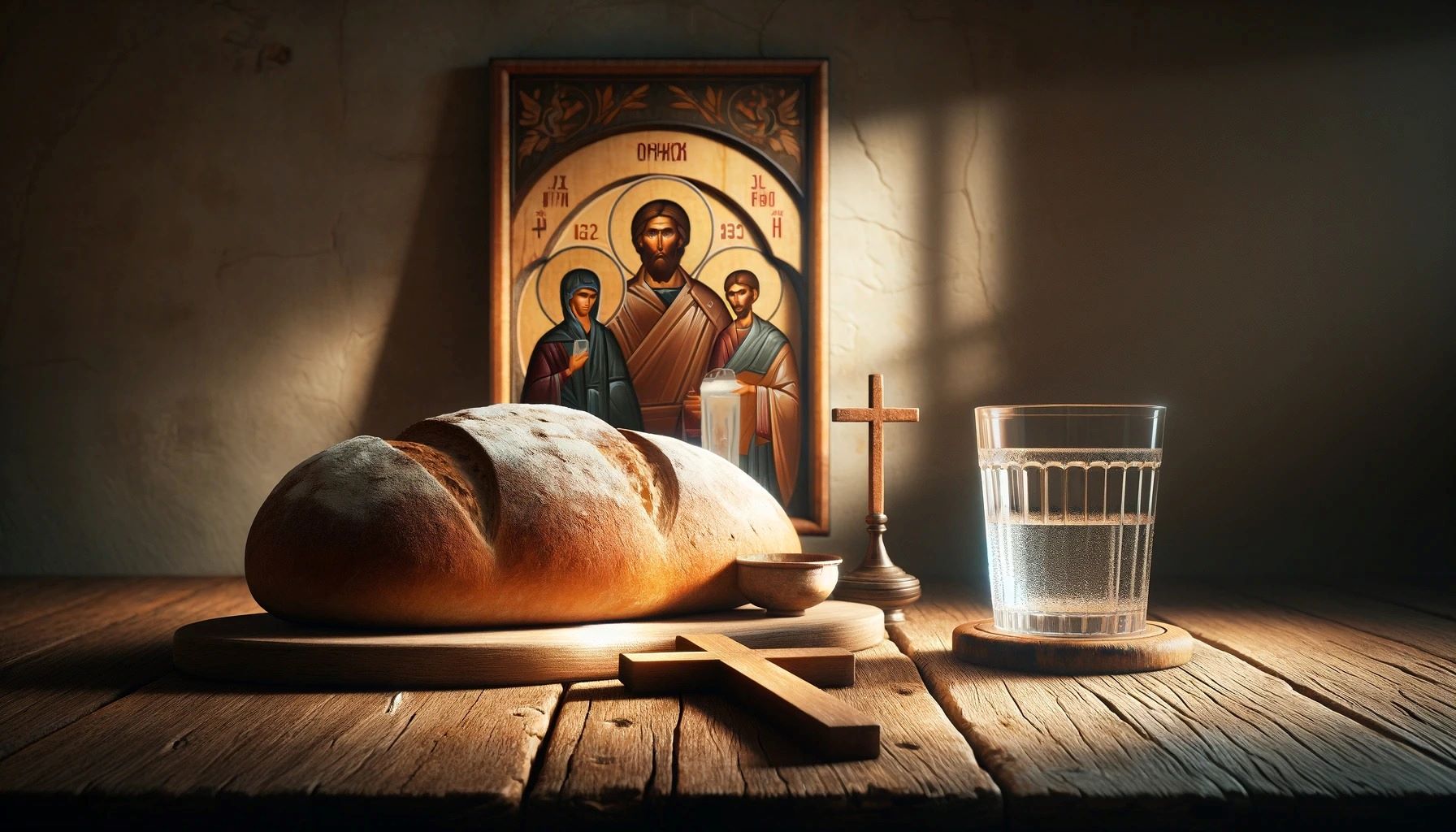Home>Special Themes>What Counts As A Small Meal During Lent


Special Themes
What Counts As A Small Meal During Lent
Published: February 29, 2024
Ericka Andersen, an editor at Christian.net, expertly merges digital strategy with content creation, focusing on faith and societal issues. Her communication skills enhance the platform's engaging narratives, fostering meaningful dialogue on belief's impact on society.
Learn what qualifies as a small meal during Lent and discover special themes to incorporate into your meals. Find ideas for observing this tradition with unique and meaningful dishes.
(Many of the links in this article redirect to a specific reviewed product. Your purchase of these products through affiliate links helps to generate commission for Christian.net, at no extra cost. Learn more)
Table of Contents
The Importance of Small Meals During Lent
During the Lenten season, the practice of consuming small meals holds significant importance for individuals observing this religious period. Lent is a time of reflection, penance, and preparation for the celebration of Easter in the Christian faith. Small meals play a crucial role in maintaining the spirit of Lent, as they symbolize simplicity, self-discipline, and solidarity with those who are less fortunate. The act of consuming small meals during Lent is not only a religious tradition but also a way to foster mindfulness, gratitude, and empathy towards others. It serves as a reminder of the sacrifices made by Jesus Christ and encourages individuals to focus on spiritual growth and self-restraint.
-
Symbol of Simplicity and Self-Discipline: Small meals during Lent symbolize the simplicity and self-discipline that are central to the Lenten observance. By partaking in modest portions and simple fare, individuals are reminded to detach themselves from excessive indulgence and material desires, focusing instead on spiritual nourishment and inner reflection.
-
Solidarity with the Less Fortunate: The act of consuming small meals fosters a sense of solidarity with those who struggle with food insecurity. It serves as a reminder of the importance of empathy and compassion towards those who may not have access to an abundance of food. This practice encourages individuals to appreciate the blessings of sustenance and to consider the needs of others in their communities.
-
Mindfulness and Gratitude: Small meals encourage mindfulness and gratitude. By consciously choosing to consume smaller portions, individuals are prompted to reflect on the significance of each meal and express gratitude for the nourishment they receive. This mindfulness cultivates a deeper appreciation for the sustenance provided and encourages a more intentional approach to eating during the Lenten period.
-
Spiritual Growth and Self-Restraint: The consumption of small meals aligns with the emphasis on spiritual growth and self-restraint during Lent. It serves as a physical manifestation of the commitment to moderation and discipline, allowing individuals to focus on their spiritual journey and the development of virtues such as patience, humility, and self-control.
In essence, small meals during Lent hold a profound significance beyond mere dietary restrictions. They embody the spiritual principles of simplicity, empathy, mindfulness, and self-discipline, enriching the Lenten experience and reinforcing the core values of the Christian faith.
Read more: What Is Almsgiving During Lent?
Traditional Small Meal Options
-
Vegetable Soup and Bread: A classic and nourishing option, vegetable soup paired with a slice of whole-grain bread provides a satisfying and wholesome small meal. The simplicity of the ingredients aligns with the spirit of Lent, and the warmth of the soup offers comfort during this reflective period.
-
Rice and Beans: This humble yet nutritious combination is a staple in many cultures and holds a place of honor in Lenten traditions. The protein and fiber from the beans, combined with the energy-providing carbohydrates from the rice, create a balanced and filling small meal.
-
Fish and Vegetables: As fish is often permitted during Lent, a small serving of grilled or baked fish accompanied by steamed or roasted vegetables offers a light and protein-rich option. The inclusion of omega-3 fatty acids from the fish contributes to a heart-healthy meal.
-
Lentil Stew: Lentils, a source of plant-based protein, are a popular ingredient in Lenten meals. A hearty lentil stew, flavored with aromatic herbs and spices, provides a satisfying and nourishing option for a small Lenten meal.
-
Egg and Spinach Salad: A simple salad featuring hard-boiled eggs, fresh spinach, and a light vinaigrette dressing offers a refreshing and protein-packed small meal. The combination of textures and flavors makes this option both nutritious and enjoyable.
-
Cheese and Crackers: For a quick and convenient small meal, a selection of quality cheeses paired with whole-grain crackers provides a source of protein, calcium, and fiber. This uncomplicated option is ideal for individuals seeking a light yet satisfying Lenten meal.
-
Fruit and Yogurt Parfait: A small serving of yogurt layered with fresh fruits and a sprinkle of granola creates a delightful and nutritious small meal. The natural sweetness of the fruits complements the creamy yogurt, offering a refreshing option during the Lenten season.
These traditional small meal options reflect the principles of simplicity, moderation, and nourishment that are integral to the Lenten observance. By embracing these time-honored choices, individuals can partake in fulfilling and meaningful meals while honoring the spiritual significance of the Lenten period.
Creative Small Meal Ideas
-
Quinoa and Roasted Vegetable Bowl: A colorful and nutrient-rich option, a quinoa and roasted vegetable bowl offers a creative twist on traditional Lenten meals. Roasted bell peppers, zucchini, and cherry tomatoes combined with fluffy quinoa create a satisfying and visually appealing small meal.
-
Mushroom and Spinach Quesadilla: Incorporating sautéed mushrooms and fresh spinach between whole-grain tortillas, a mushroom and spinach quesadilla provides a flavorful and protein-packed alternative for a small Lenten meal. The earthy richness of the mushrooms complements the vibrant flavors of the spinach, resulting in a delightful dish.
-
Stuffed Bell Peppers: Hollowed-out bell peppers filled with a savory mixture of quinoa, black beans, and diced vegetables offer a creative and wholesome small meal option. The vibrant bell peppers serve as both a flavorful vessel and a source of essential vitamins, making this dish a nutritious addition to Lenten menus.
-
Cauliflower "Steak" with Chimichurri Sauce: Sliced cauliflower steaks, grilled to perfection and drizzled with zesty chimichurri sauce, present a visually striking and flavorful small meal. This inventive dish showcases the versatility of cauliflower and provides a satisfying option for individuals seeking a unique Lenten dining experience.
-
Sweet Potato and Black Bean Tacos: Soft corn tortillas filled with roasted sweet potatoes, black beans, and a medley of fresh toppings offer a creative and satisfying small meal. The combination of sweet and savory flavors, along with the array of textures, makes this Lenten taco option a delightful departure from traditional fare.
-
Coconut Curry Lentils: A fragrant and aromatic small meal, coconut curry lentils infuse Lenten dining with exotic flavors and comforting warmth. The creamy coconut milk and aromatic spices elevate the humble lentils, creating a memorable and nourishing culinary experience.
-
Mediterranean Stuffed Portobello Mushrooms: Large portobello mushrooms filled with a savory mixture of quinoa, sun-dried tomatoes, and feta cheese provide a sophisticated and flavorful small meal option. The Mediterranean-inspired flavors and hearty texture of the mushrooms make this dish a standout choice for Lenten dining.
These creative small meal ideas offer a departure from traditional Lenten fare while maintaining the principles of simplicity, nourishment, and mindfulness. By embracing innovative and flavorful options, individuals can enrich their Lenten experience with a diverse array of satisfying and spiritually meaningful meals.
Nutritional Considerations for Small Lenten Meals
When crafting small meals for the Lenten season, it is essential to prioritize nutritional balance and adequacy. Despite the modest portions, these meals should provide essential nutrients to support overall health and well-being. Incorporating a variety of food groups and mindful ingredient choices can ensure that Lenten small meals are not only spiritually meaningful but also nutritionally sound.
Emphasizing Plant-Based Proteins
In the absence of meat on certain days of Lent, plant-based proteins play a crucial role in small meal options. Legumes, such as lentils, chickpeas, and black beans, offer a rich source of protein, fiber, and essential minerals. Including these plant-based proteins in small meals contributes to satiety and supports muscle maintenance and overall bodily function.
Read more: What Is Penance During Lent
Incorporating Whole Grains
Whole grains, such as quinoa, brown rice, and whole-grain bread, provide complex carbohydrates, fiber, and various micronutrients. These nutrient-dense grains can form the foundation of small Lenten meals, offering sustained energy and promoting digestive health. By incorporating whole grains, individuals can enhance the nutritional quality of their meals while honoring the traditions of Lent.
Prioritizing Omega-3 Fatty Acids
Incorporating sources of omega-3 fatty acids, such as flaxseeds, chia seeds, and walnuts, can contribute to heart health and overall well-being during the Lenten season. Small meals featuring ingredients rich in these essential fatty acids offer a valuable nutritional boost, supporting cardiovascular function and promoting anti-inflammatory benefits.
Balancing Macronutrients
Small Lenten meals should strive to achieve a balance of macronutrients, including carbohydrates, proteins, and healthy fats. This balance ensures that individuals receive a well-rounded array of nutrients, supporting energy levels, muscle function, and overall metabolic health. By carefully selecting ingredients that contribute to this macronutrient balance, small Lenten meals can offer comprehensive nourishment.
Incorporating Abundant Vegetables
Vegetables form a vital component of small Lenten meals, providing essential vitamins, minerals, and dietary fiber. Embracing a variety of colorful and nutrient-rich vegetables ensures that small meals are not only nutritionally dense but also visually appealing. The inclusion of abundant vegetables supports overall health and contributes to the fulfillment of dietary requirements.
Read more: What Scriptures To Read During Lent
Mindful Portion Control
While nutritional considerations are paramount, mindful portion control is equally important when preparing small Lenten meals. Ensuring that portions are modest yet sufficient to meet nutritional needs is essential for maintaining a balanced approach to eating during Lent. By practicing mindful portion control, individuals can derive the nutritional benefits of small meals while upholding the spirit of moderation and self-discipline.
By integrating these nutritional considerations into the preparation of small Lenten meals, individuals can partake in a dietary approach that aligns with both the spiritual and physical dimensions of the Lenten season. These considerations not only enhance the nutritional quality of meals but also contribute to a holistic and mindful approach to nourishment during this sacred period.
Balancing Small Meals with Fasting Practices
The practice of consuming small meals during Lent is often complemented by periods of fasting, where individuals abstain from certain foods or limit the quantity of food consumed. Balancing small meals with fasting practices is integral to the Lenten observance, as it underscores the principles of self-discipline, spiritual reflection, and solidarity with the less fortunate.
Mindful Timing of Meals
When incorporating small meals into the fasting regimen of Lent, mindful timing of meals is essential. Individuals may choose to schedule their small meals at specific intervals, aligning with the traditional fasting periods observed within their religious community. By adhering to a structured meal schedule, individuals can honor the fasting practices while ensuring that their small meals provide sustenance and nourishment during designated times.
Modest Portions in Accordance with Fasting Guidelines
The portion sizes of small Lenten meals should align with the fasting guidelines prescribed by religious traditions. By consuming modest portions, individuals demonstrate a commitment to self-restraint and moderation, in harmony with the spirit of fasting. Adhering to the recommended portion sizes allows individuals to partake in the symbolic act of self-denial while still receiving the essential nutrients needed to sustain them throughout the fasting period.
Read more: What Is The Liturgical Color During Lent?
Nutrient-Dense Choices to Support Fasting Periods
Selecting nutrient-dense foods for small Lenten meals is crucial for supporting the body during fasting periods. By choosing foods rich in essential nutrients, individuals can maintain their energy levels and overall well-being while abstaining from certain dietary components. Nutrient-dense small meals contribute to physical strength and vitality, enabling individuals to uphold the fasting practices with mindfulness and resilience.
Hydration and Nourishment During Fasting
In addition to small meals, adequate hydration and nourishment play a vital role in balancing fasting practices during Lent. Incorporating hydrating elements such as herbal teas, infused water, and clear broths into the fasting regimen ensures that individuals remain nourished and refreshed. These hydrating components complement the small meals, contributing to a holistic approach to fasting that encompasses both physical and spiritual well-being.
Reflection and Spiritual Nourishment
Balancing small meals with fasting practices extends beyond the physical aspect of nourishment; it encompasses spiritual reflection and inner nourishment. The act of fasting, coupled with the consumption of small, simple meals, fosters a deeper connection to one's faith and spiritual journey. It provides an opportunity for individuals to engage in introspection, prayer, and meditation, enriching the Lenten experience with profound spiritual nourishment.
Cultivating Compassion and Empathy
The integration of small meals and fasting practices during Lent serves as a catalyst for cultivating compassion and empathy. By experiencing moments of hunger and practicing self-denial, individuals gain a heightened awareness of the struggles faced by those who endure food insecurity. This awareness fosters a spirit of empathy and solidarity, prompting individuals to engage in acts of charity and support for those in need, thereby embodying the true essence of Lenten observance.
In essence, balancing small meals with fasting practices during Lent involves a harmonious integration of physical nourishment, spiritual reflection, and solidarity with others. By embracing this balance, individuals can partake in a Lenten journey that encompasses both the physical and spiritual dimensions, fostering a deeper connection to their faith and a profound sense of communal solidarity.












